Ben Carson joins Donald Trump as a threat to leave Republicans behind
By the numbers
Welcome to Trail Guide, your host through the wilds of the 2016 presidential campaign. It's Friday, Dec. 11, and here's what we're talking about:
- Ben Carson warns party leaders not to "subvert the will of the voters"
- What's Marco Rubio like trying to negotiate a deal ? "Antsy." "Jitterbug."
- Donald Trump goes after a rival cutting into his lead in the polls: Ted Cruz
- Trump deepens the divide between Republicans and voters overall, polls show
- After the spate of mass shootings this fall, Democrats are campaigning heavily on gun control
'Bloodsucking politicians' and 'money guys' could try to snatch GOP nomination, Trump says
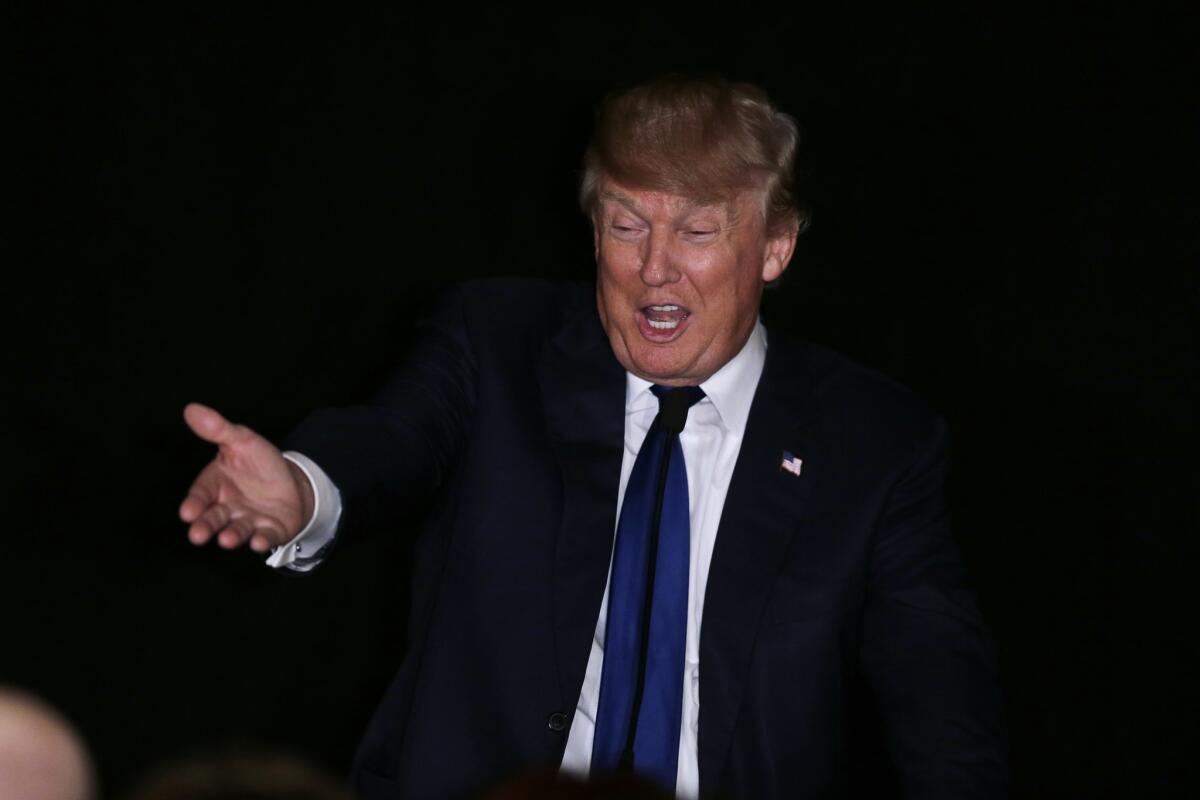
Republican front-runner Donald Trump meets with police union members in Portsmouth, N.H., on Thursday.
DES MOINES – Donald Trump suggested Friday that “bloodsucking politicians” and big-money donors could try to deny him the Republican presidential nomination next summer at a brokered party convention in Cleveland.
Trump predicted he would ultimately win, but acknowledged potential trouble if his delegate count is bigger than any rival’s but short of what’s needed to secure the nomination.
“If I’m two votes short, I have a problem,” he told about 2,000 supporters at a rally in Des Moines.
Trump’s remarks came amid rising alarm among leaders of the party’s establishment that the real estate mogul has solidified his wide lead in national polls of Republicans. His call this week for banning Muslims from entering the United States was the latest in a long series of Trump remarks that establishment leaders fear will harm the party in the November 2016 election.
Those remarks have put some of his Middle East real estate deals in jeopardy, and Trump avoided the topic in Des Moines. But he did accuse Chancellor Angela Merkel of “destroying Germany” by welcoming Syrian refugees. The crowd burst into cheers as Trump said he wanted none of the refugees in America.
“I don’t want them, because we don’t know who they are,” he said.
Trump also played up his own religious heritage. “I am an evangelical,” he said. “I’m a Christian. I’m a Presbyterian.”
Trump’s chief rival for evangelical support in Iowa’s Feb. 1 GOP caucuses is Texas Sen. Ted Cruz. He reminded the crowd that Cruz opposes ethanol subsidies that are highly popular in the agricultural state, saying Cruz “gets a lot of oil money” from donors. “If Ted Cruz is against ethanol, how does he win Iowa? Because that’s very anti-Iowa.”
As for a brokered convention, Trump said he’d be forced to deal “with all these bloodsucker politicians” and “their money guys.”
“They’ll be in the back room making deals,” he said. “But if I get the number of delegates, there’s not a thing they can do.”
Donald Trump's supporters aren't all deeply conservative
Support for Donald Trump divides the Republican electorate along lines of class but not ideology with blue-collar voters — those without a college degree — giving him his biggest base of support.
The divide between the GOP's blue-collar and white-collar wing has shown up repeatedly in polls throughout the election season. It's clearly on display in new findings released Friday by SurveyMonkey, the online polling firm, which has been tracking the electorate since early this summer.
Trump's support varies little by ideology. His backers closely mirror the distribution of very conservative, conservative and moderate voters within Republican ranks, SurveyMonkey's data show.
That's a contrast with some other candidates.
Trump as GOP nominee? Idea scares Democrats, poll finds
Most Democrats, nearly 6 in 10, say they would be “scared” if Donald Trump were to win the Republican presidential nomination; most Republicans would be “hopeful” or “excited.”
About 1 in 4 in both parties admit they would be “surprised.”
Those are a few of the findings from a new election-tracking survey by SurveyMonkey, the online polling firm. The survey, taken Dec. 8-10, is part of a long-term project conducted since early this summer.
The firm’s tracking also allows a close look at the nature of Trump’s support within the GOP. It’s not ideological – Trump’s backers closely mirror the distribution of very conservative, conservative and moderate voters within Republican ranks, the polls have found.
Instead of an ideological division, Trump has taken advantage of the sharp class divide among Republicans. He has consolidated support of the party’s blue-collar, non-college-educated wing, while the party’s more affluent, college-educated voters remain split among several candidates.
About one-third of Republican voters who have a high school education or less back Trump, which puts him far ahead of Ben Carson, the retired neurosurgeon who is in second place with that group, at 17%. Ted Cruz at 9%, Marcio Rubio at 7% and Jeb Bush at 6% round out top five.
But among those with a college degree or more, Trump’s lead is much smaller. He has 21% of the voters in that group, compared with 19% for Carson, 13% for Rubio, 9% for Cruz and 6% for Bush.
In recent election cycles, about half the GOP primary electorate has had a college degree.
Jeb Bush's deeply unfavorable image with Republican voters
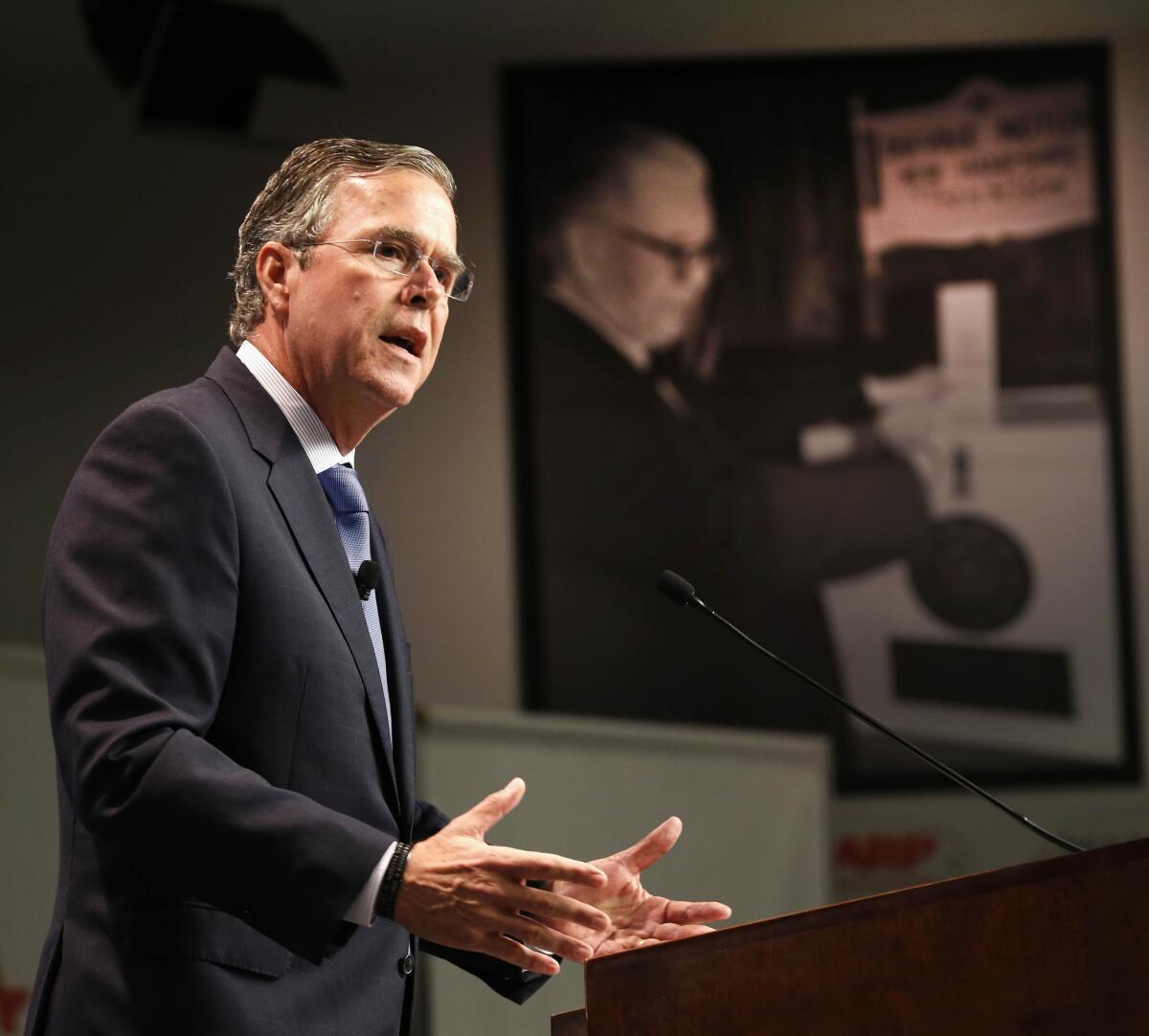
Former Florida Gov. Jeb Bush announces his plan to repeal and replace President Obama’s healthcare law, Tuesday at Saint Anselm College in Manchester, N.H.
Just how deep is the hole that former Florida Gov. Jeb Bush finds himself in?
Consider this: Only 37% of Republican voters have a favorable view of Bush, compared with 57% who view him unfavorably, according to the latest election tracking from SurveyMonkey, the online polling firm.
The polling, done Dec. 8-10, questioned 3,372 Republican registered voters. It's part of a long-term election-tracking project that SurveyMonkey has conducted since early summer.
Not only do more than half the Republican voters have a negative view of Bush, almost 3 in 10, 29%, said their view was "very unfavorable."
By comparison, 63% of Republicans have a positive view of Donald Trump, compared with 34% who see him unfavorably. Views of Trump tend to be strongly held: 39% said they viewed him very favorably, and 22% view him very unfavorably.
Opinions are less strongly held about two other leading candidates, Sen. Marco Rubio of Florida and Sen. Ted Cruz of Texas, the poll found. They are seen positively by 61% and 66%, respectively. The share with a negative view is 32% for Rubio and 27% for Cruz. Only about 1 in 10 voters had a very unfavorable view.
Questions about how SurveyMonkey conducts its polls? Here's an explainer.
Ilana, Abbi and Hillary Clinton on 'Broad City' — what could possibly go wrong?
Comedy Central announced Friday that Democratic presidential front-runner Hillary Clinton will appear in an episode of "Broad City" in its third season, which premieres Feb. 17. Clinton's campaign and the show itself promoted the appearance Friday on Twitter.
The timing is noteworthy, if Clinton does appear in the season premiere. It would come just a week after the New Hampshire primary and days before the Nevada caucuses.
Ben Carson threatens to leave the Republican Party
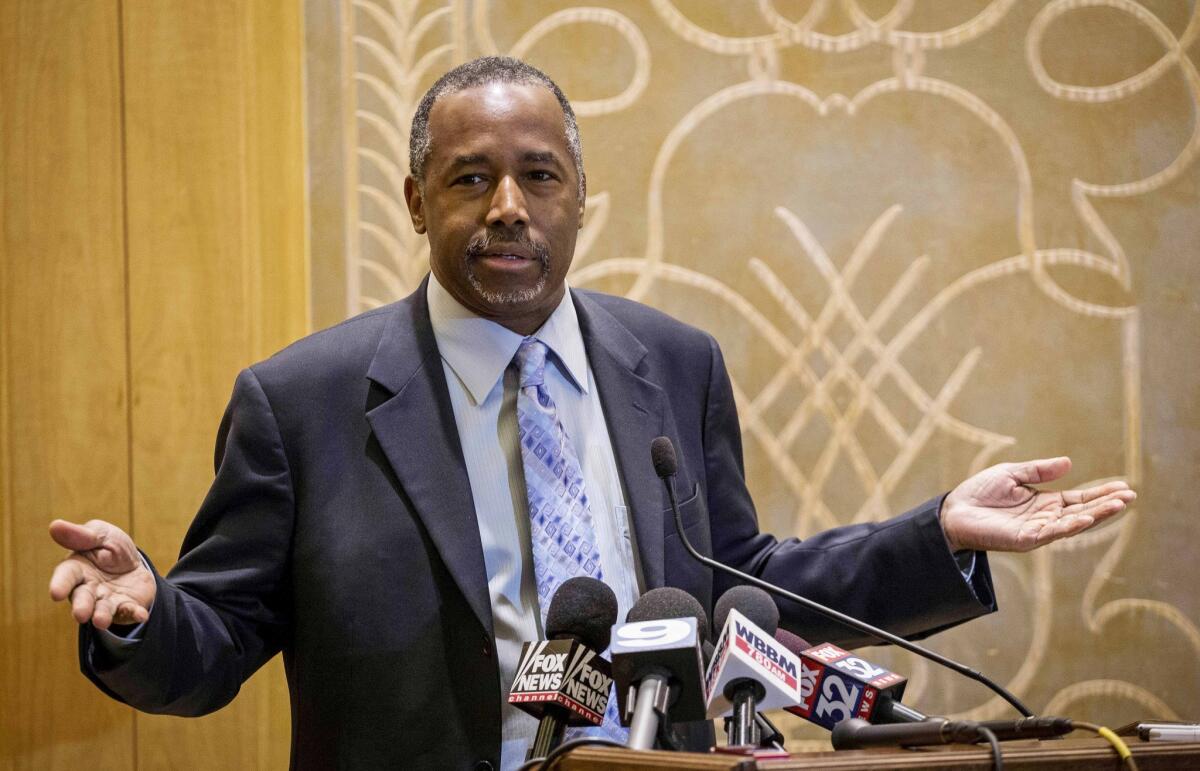
Republican presidential candidate Ben Carson takes questions from reporters Thursday at the Peninsula Hotel in Chicago.
In what would be a nightmare scenario for the GOP, presidential candidate Ben Carson threatened Friday to leave the Republican Party amid reports of deepening concerns from GOP officials about the splintered 2016 electorate.
The retired neurosurgeon lashed out at Republican leaders who discussed the possibility of a "brokered convention" during a recent private dinner in Washington. The Washington Post first reported Thursday that the group, including Republican National Committee Chairman Reince Priebus and Senate Majority Leader Mitch McConnell, addressed the sustained strength of billionaire businessman Donald Trump and the possibility that a consensus nominee might not emerge before the party's mid-July national convention in Cleveland.
"If this was the beginning of a plan to subvert the will of the voters and replace it with the will of the political elite, I assure you Donald Trump will not be the only one leaving the party," Carson said in a statement that referenced Trump's repeated threats to leave the GOP if treated "unfairly."
Top Democrats present debate-day contrast with GOP
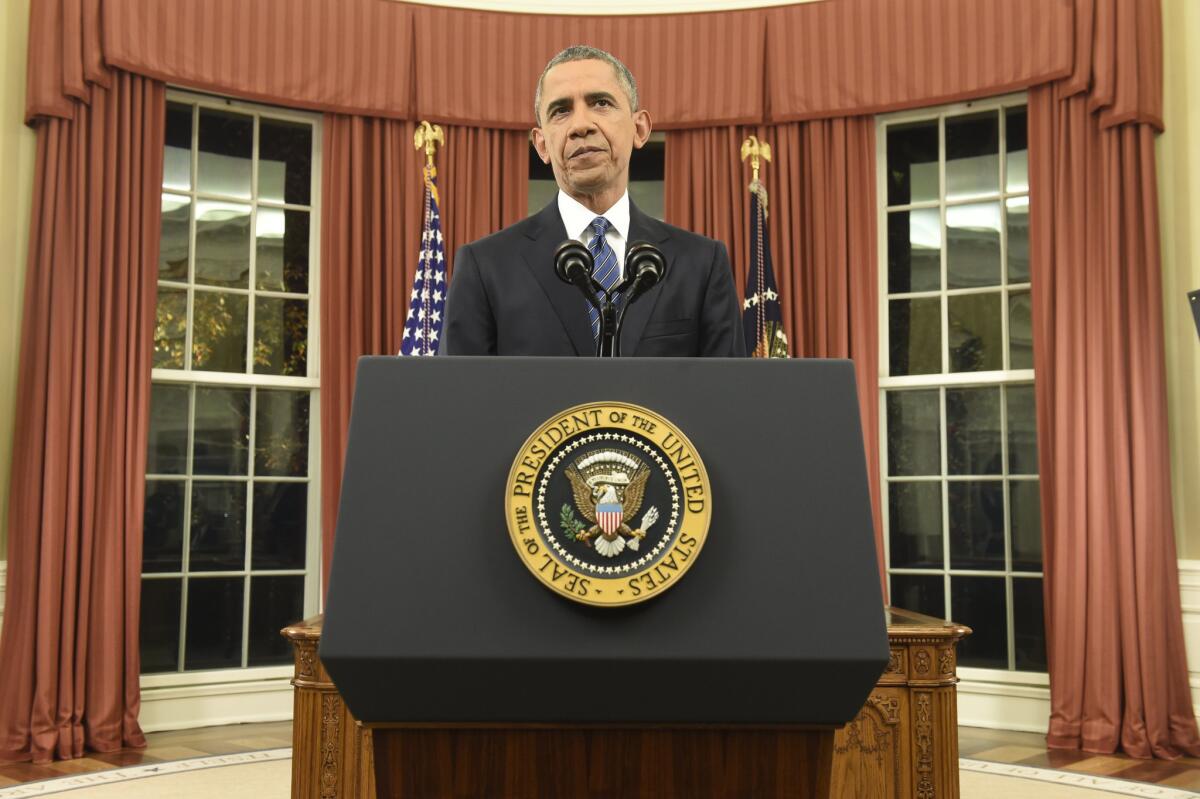
President Barack Obama addresses the U.S. from the Oval Office on Sunday.
With Republicans set to gather for another prime-time debate in Las Vegas on Tuesday, one sure to include a new emphasis on immigration and national security, the nation's two leading Democrats are doing some conspicuous counter-programming.
The White House announced on Friday that President Obama would attend a naturalization ceremony at the National Archives in Washington that morning.
The president has used such settings in the past to renew his call to "pass common sense immigration reform," as he did at a similar event in the East Room of the White House on Independence Day last year. This time, it offers Obama an opportunity -- surrounded by some of the nation's founding documents -- to emphasize his call for Americans to not betray the country's tradition of religious tolerance in the wake of the massacre in San Bernardino.
Meanwhile, Hillary Clinton's campaign announced that she wold give a speech in Minnesota on Tuesday outlining her counterterrorism strategy, including how to address the threat of domestic radicalization.
Minneapolis has a sizable Muslim population and officials have pointed to a pilot project there in which federal and local law enforcement have partnered with the local Muslim community to work to counter attempts by extremists groups to radicalize Americans.
This week, a 10th man from the Twin Cities was charged in federal court with planning to travel to the Middle East to fight for Islamic State, according to local reports.
Watch out, Ted Cruz. You're next on Trump's list.
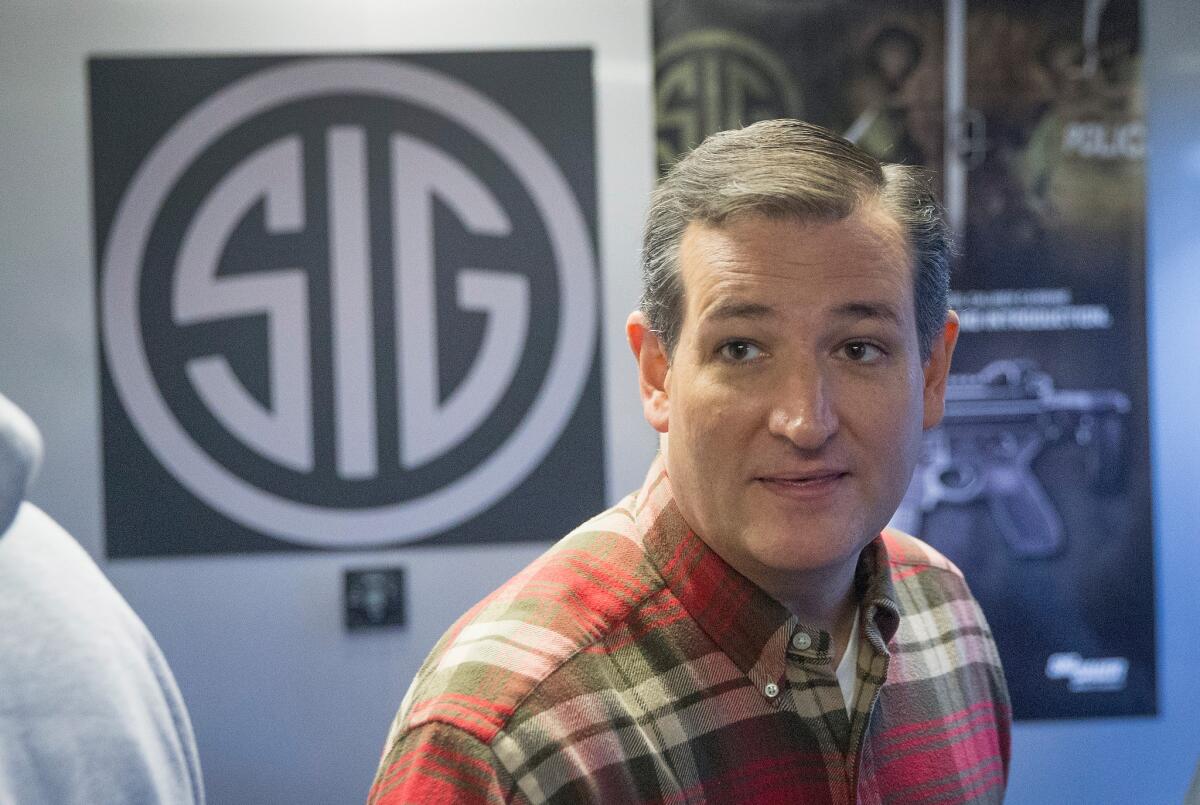
JOHNSTON, IA - DECEMBER 04: Republican presidential candidate Sen. Ted Cruz (R-TX) visits with SIG Sauer representatives during a campaign event at CrossRoads Shooting Sports gun shop and range on December 4, 2015 in Johnston, Iowa. A recent poll had Cruz tied for third place with Ben Carson and behind Sen. Marco Rubio (R-FL) and front runner Donald Trump in the race for the Republican presidential nomination. (Photo by Scott Olson/Getty Images) ** OUTS - ELSENT, FPG, CM - OUTS * NM, PH, VA if sourced by CT, LA or MoD **
Texas Sen. Ted Cruz has tried to avoid picking a fight with Donald Trump, who savors the art of destroying his rivals. But Cruz may now have one on his hands.
Trump used his favorite attack format, Twitter, to warn Cruz of his impending doom.
Why is Trump seeking revenge? The first reason is poll-driven. Cruz is gaining on Trump and leading in at least one Iowa survey, a key state where influential social conservative Bob Vander Plaats endorsed Cruz on Thursday. The second is that Cruz is said to have insulted Trump behind closed doors, questioning to donors whether either Trump or Ben Carson has the judgment to lead the nation in a tumultuous time and predicting they would not win the election.
“People run as who they are. I believe gravity will bring both of those campaigns down,” Cruz said at a Wednesday gathering in New York, according to a recording published by the New York Times.
Trump took the comments as a frontward assault, even if they were not intended to be made public. He labeled the donors as Cruz’s “bosses,” a reference to Trump’s contention that he is the only candidate not beholden to big-money donors.
Cruz has been disciplined in avoiding confrontations with Trump, even as the front-runner has made provocative statements that other Republicans have denounced. Insults from Trump have tended to hurt rival campaigns in the polls.
Cruz has another reason for avoiding a battle: He is trying to cultivate Trump’s voters in hopes that they will gravitate to his campaign if Trump flames out.
Donald Trump's views excite his fans but alienate the rest of voters

(Jim Cole / Associated Press)
The first measures of public opinion on Donald Trump's proposal to ban most Muslims from entering the country underscore the fears of the GOP establishment: The idea gets strong support within Republican ranks but alienates much of the rest of the electorate.
The strongest evidence comes from a new NBC/Wall Street Journal poll, which finds that a plurality of Republican voters, 42%, said they support Trump's plan, compared with 36% who oppose it.
By contrast, among voters overall, only 25% supported Trump's idea, while 57% opposed it.
In the immediate aftermath of Trump's announcement that he would call for a ban on most Muslims immigrating to or visiting the U.S., Republican congressional leaders and several of Trump's rivals for the nomination were quick to reject the idea.
Since then, however, as evidence has accumulated that many Republican voters agree with the billionaire businessman, the chorus of criticism has grown muted.
Fiorina: Clinton failed on U.S. foreign policy
Carly Fiorina accused former Secretary of State Hillary Clinton on Friday of failing to manage foreign policy, sharpening ahead of the next Republican debate what she sees as a chief asset: her ability to negate Clinton's push to be the first female president.
Once Chief Executive of Hewlett-Packard, Fiorina cited her international business work with more than 100 countries and her seat on the advisory board of the CIA as evidence of what she see as her ability to run the country’s foreign policy with more insight into U.S. intelligence capabilities than Clinton.
“[Clinton] met met a lot of people and did a lot of photo ops,” Fiorina said on CNN's "New Day." “I’ve met not as many foreign leaders as she has, but a lot and more than anyone else, and I didn’t do photo ops.”
“She has been wrong on every single foreign policy challenge,” she added.
The GOP presidential hopeful also said front-runner Donald Trump uses media pandering to his bombastic comments in order to build support.
In reaction to Trump’s proposal to ban Muslims from traveling to the United States, she said he uses shocking statements and language to grab media attention when his popularity dips in the polls.
She blamed the media for Trump’s success and said coverage does not fairly report on the other candidates, arguing with “New Day” host Chris Cuomo about media tactics. She went on to say that some of Trump’s rhetoric does reflect the irritation voters have with the Obama administration.
“In a way, Donald Trump is a reaction to the unbelievable weakness and delusional nature of national security policy from Barack Obama and Hillary Clinton,” Fiorina said. “People are utterly frustrated by the ineptitude of this government.”
Clinton calls Trump 'dangerous' on 'Late Night'
Hillary Clinton finds Donald Trump’s words “shameful” and “dangerous,” she told “Late Night” host Seth Meyers on Friday. The Democratic front-runner’s appearance on the show, recorded in the morning, centered on her opinions of Republican candidate Trump’s statements and her husband’s role in a potential presidency.
Clinton again denounced Trump’s proposal to ban Muslims from traveling to the United States and Meyers said her choice put her “in good company with the world.”
“I think everybody, and especially the Republicans, need to stand up and really say, 'Enough, you’ve gone too far. That’s not who we are, that’s not the kind of country that we believe we are, and we’re just not going to tolerate it,’" Clinton said.
Clinton echoed President Obama's Oval Office address in saying that Trump’s anti-Muslim remarks play into the plans of dangerous people like Islamic State. She said his words support their propaganda tactics fueling fear and hatred.
Meyers then turned the conversation to Clinton’s husband, former President Clinton, and his qualifications to take on the role as “first lady” of the White House.
Clinton said she values her husband’s advice on economic and foreign policy issues like interacting with Russian President Vladimir Putin. But she also lauded his skills as a host of what would be many guests.
“He loves giving tours, so he'll probably want to do a lot of that," she said.
What Marco Rubio's foray into the 2013 immigration overhaul revealed about his political skills
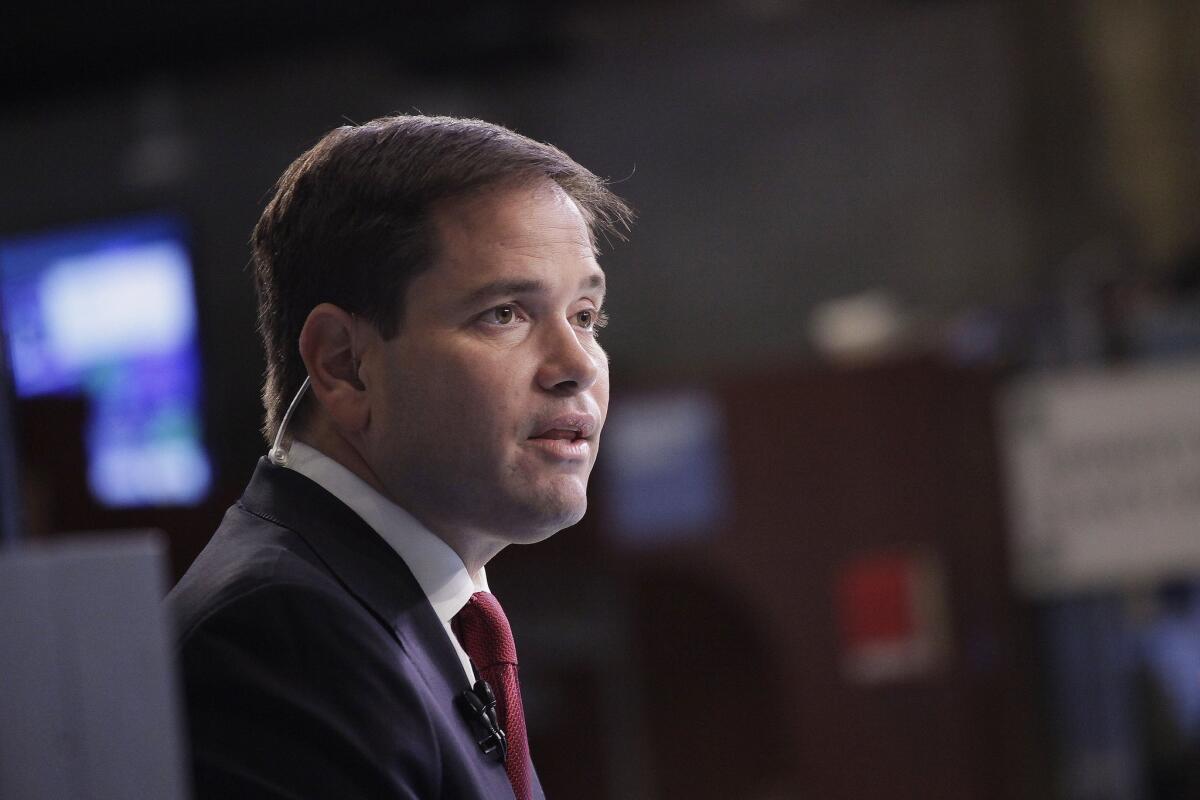
When a bipartisan group of senators dubbed the “Gang of Eight” began tackling immigration reform in 2012, a key goal for members of the group was to keep Sen. Marco Rubio (R-Fla.) in the fold.
Rubio said he would be unable to persuade fellow conservatives to support a special path to citizenship for the estimated 11 million people in the country illegally, so an alternative was devised. It was a complicated workaround that avoided creating a special process, but increased the total number of people who could become citizens. Rubio signed on.
It was only later that he and the other senators discovered that the new approach, with its larger overall number, would backfire politically and lead to more objections fromthe same conservatives Rubio was trying to mollify. The bill passed the Senate in June 2013 with Rubio’s vote, but he then withdrew his support amid a conservative backlash, and the legislation died in the House.
The episode was one of several in the drafting of the immigration reform bill that provide a window into the legislative and political skills of Rubio, now seen by some in his party as the most promising Republican presidential candidate.
During the immigration battle, Rubio showed keen political instincts and a quick grasp of tricky policy issues. Senators saw him as a hard worker, willing to roll up his sleeves to hammer out details, canceling a flight home one weekend as negotiations dragged on all night.
But as shown in the problematic citizenship workaround that was created for him, Rubio also became known as a relatively inexperienced lawmaker whose short-term political calculations sometimes worked against his long-term goals.
By the numbers
Get the L.A. Times Politics newsletter
Deeply reported insights into legislation, politics and policy from Sacramento, Washington and beyond. In your inbox three times per week.
You may occasionally receive promotional content from the Los Angeles Times.







